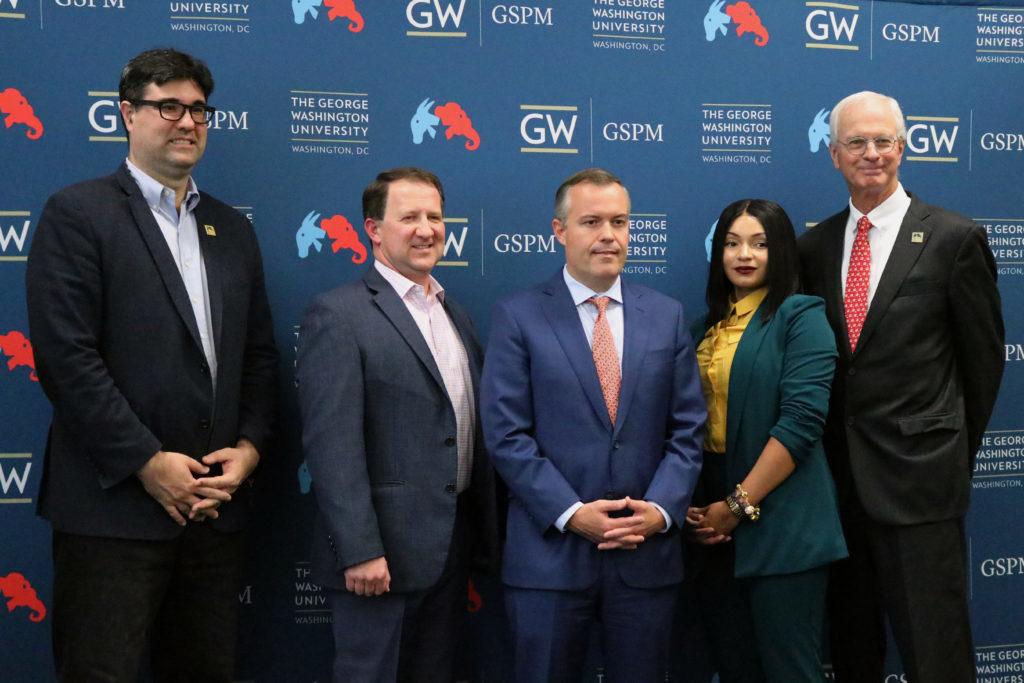A panel of political experts discussed election security ahead of the 2020 presidential election at the Milken Institute School of Public Health Thursday.
Panelists discussed how campaign staff can protect their information from cyberattacks at the event, which was titled “Securing the 2020 Vote: The Intersection of Campaign Management & Election Data Integrity.” The panel, this year’s annual Frank J. Fahrenkopf & Charles T. Manatt Lecture hosted by the Graduate School of Political Management, was part of the school’s Alumni Achievement Awards ceremony.
Jude Meche, the chief information security officer for the Democratic Senatorial Campaign Committee, said protecting election infrastructure from cyberattacks “shouldn’t be a partisan issue and will be important beyond the upcoming 2020 presidential election.
“We have to think much larger, this is not just a 2020 issue,” Meche said. “This is a moving forward issue. It’s Republicans in the White House now, but in the future, who knows?”
Meche said the extensive discourse about Russian interference in the 2016 presidential election has increased awareness about the issue and led to the implementation of some technological measures to combat foreign election interference.
“But, you know, by the same token, there’s more players in the market now,” Meche said. “It’s not just one or two nation-states.”
Matt Rhoades, who managed the failed 2012 presidential campaign of Sen. Mitt Romney, R-Utah, said that while discussions about cybersecurity in elections have focused on Russia in the past, countries like China and Iran may become major cybersecurity threats in the next election cycle.
“You have to look past just Putin, we know what he’s up to,” Rhoades said. “We know that the Chinese play this game. But if you’re a Republican too, you know that the Iranians are now fully invested in this kind of effort, and they’re going to be targeting Republicans, especially, who have been hardcore on things like the Iranian nuclear deal.”
Rhoades said political campaigns, especially those in down-ballot races, are often “very haphazard” about their cybersecurity approach and lack the budgets to properly invest in security measures, which makes them even more susceptible to foreign interference.
“They just don’t have the resources to do anything to make sure their campaign, or their candidate especially, has any kind of cybersecurity,” Rhoades said.
Rhoades co-founded the Defending Digital Democracy project in 2017 at Harvard University’s Belfer Center for Science and International Affairs with Robby Mook, the campaign manager for Hillary Clinton’s failed 2016 presidential bid. Later that year, Rhoades and Mook co-authored the Cybersecurity Campaign Playbook, a guide for political campaigns to guard against attacks in the changing digital landscape.
Rhoades said he helped develop the playbook because he wanted to arm campaigns with the “resources, ideas and ways to do things” to safeguard against foreign election interference.
Maurício Moura, the founder and chief executive officer of IDEIA Big Data, a data analytics firm, said campaigns should start raising dedicated funds for cybersecurity to equip themselves with the necessary tools to ward off cyberattacks.
“They are raising money for lawyers and they’re raising money for accountants,” Moura said. “They should start raising money for this specifically because this is a big issue.”
With the rise of “deepfake” technology, which uses artificial intelligence to create extremely convincing fake audio and video recordings, Moura said “the real battle” will be equipping the public with the skills and education to distinguish between facts and falsehoods.
“You have to teach people to receive information, to ask themselves if they’re going to share that information, to try and find the source of that information,” he said.





